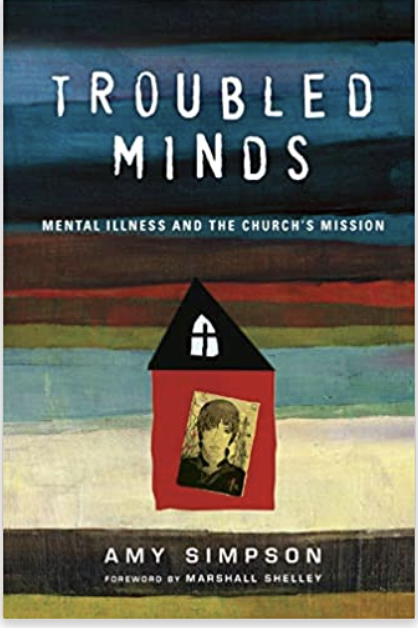
Eight Ways the Church Can Care for the Mentally Ill
Dear Friends,
It’s not surprising that the holiday season can be hard on those afflicted with a mental disorder. The church is uniquely placed to respond, and now is the time to learn how we can better love the afflicted. I hope this blog helps us all consider how we can serve the least and the lost in this season.
Stigma, Shame, and Misunderstanding of the Mentally Ill
One of the greatest catalysts to our pain was the sense that we are alone. Amy Simpson, Troubled Minds: Mental Illness and the Church’s Mission
When author Amy Simpson’s mother was diagnosed with schizophrenia, church leaders and members didn’t know what to say, so they said little, leaving her family feeling alone and helpless.
“Can you explain to me why Anna’s bipolar disorder and her dependence on medication is not an issue of weak faith or sin?”
A church leader asked this question of psychologist Matthew S. Stanford, author of Grace for the Afflicted: A Clinical and Biblical Perspective on Mental Illness. As Stanford points out, the question arose from the leader’s ignorance of the neurochemical component of mental illness.
As both vignettes suggest, the church needs to be better equipped to respond lovingly to people who suffer from mental illness.
Before COVID-19, one in four North Americans and one in five people worldwide suffered from a diagnosable mental illness; experts predict the post-COVID numbers will climb. Mental illness, defined as “‘medical conditions that disrupt a person’s thinking, feeling, mood, ability to relate to others and daily functioning” includes such disorders as “major depression, schizophrenia, bipolar disorder, obsessive-compulsive disorder (OCD), panic disorder, post traumatic stress disorder, and borderline personality disorder” (Simpson, Troubled Minds, 37). Because of the many barriers the mentally ill often face in finding help, the church is one of the first places they may turn. As Dr. Stanford explains in his book, “The involvement of the church in mental health is the missing piece necessary to transform our broken system, making it accessible and more effective” (Stanford, Grace for the Afflicted, 254). Churches are well-placed to minister to this segment of the least and the lost—how can we rise to the challenge?
Is the Church Equipped to Respond to Mental Illness?
A Lifeway Study of 2014 revealed that most churches are ill-equipped to respond to the mentally ill. The following struggles were noted:
- Lack of plans to come alongside families (note: 17% of youth suffer from a mental health disorder).
- Lack of counselors on staff.
- Lack of training for leaders on recognizing and responding to mental illness.
- Lack of communication to congregations about mental health resources.
- A “stigma and culture of silence that leads to shame” (Lifeway Study of Acute Mental Illness and Christian Faith Research Report)
Eight Practical Ways the Church Can Care for the Mentally Ill
As members of the body of Christ, what steps can we take to care well for the mentally ill and their families? Let’s consider the following eight possibilities:
- Educate and equip pastors and ministry leaders to recognize and respond.
The National Alliance on Mental Illness (NAMI.org), has programs (Nami FaithNet) specifically designed to educate clergy and religious organizations on how they can help.
- Educate the congregation.
An adult education class about mental illness could focus around a book like Matthew S. Stanford’s Grace for the Afflicted or Amy Simpson’s Troubled Minds. Some churches hold classes led by professional counselors on mental health and a biblical perspective.
- Speak out with compassion.
Pastors and ministry leaders can speak openly about mental illness in sermons, Sunday school, Bible studies, and small groups. As they communicate care and concern, the afflicted recognize a safe place to share struggles.
- Make mental illness part of pastoral care ministries.
A pastoral care ministry could develop and publicize a list of mental health resources that includes local counselors, support groups, and the number of local warmlines as well as suicide hotlines (e.g., The Florida CLEAR warmline, which is, “for individuals with a mental illness who want to talk with someone who shares personal experience coping with mental health issues”).
- Address biblical misconceptions.
Pastors and ministry leaders can address biblical misconceptions about mental illness, particularly as related to suicide. As Dr. Stanford explains, “When an individual comes to a saving faith in Jesus, they are made righteous and forgiven for every sin; past, present, and future, including suicide (Ephesians 1:7)….Suicide is not the determining factor for eternal life; a saving faith in Jesus is.” (Stanford, p. 232).
- Offer support groups.
Many churches have begun support groups for the mentally ill and their families. At New Heights Church in Vancouver, Washington, pastor’s wife Cindy Hannan began a group after experiencing profound loneliness when her son was diagnosed with bipolar disorder. She partnered with a physician on staff of the church medical clinic, Dr. Elaine Tse. They believe that “with medication, counseling, and good support, people with mental illness can flourish” (Simpson, Troubled Minds, 212). For more information on beginning a support group in your local church, check out Grace Alliance and Fresh Hope.
- Listen well and offer the hope of Christ.
One of the most valuable ways to offer community support to the mentally ill and their loved ones is to listen empathetically without trying to fix. Hope is essential to recovery and healthy living. We as Christians have the hope that surpasses all understanding, the firm conviction that Jesus Christ will return to restore all broken creation.
- Pray.
Finally, we should always begin and end with prayer. Pastors and ministry leaders can be intentional about praying for the mentally and emotionally afflicted as well as the physically afflicted. We as individuals can make a regular practice of praying for all people affected by mental illness.
In this season, which often intensifies suffering, may we pray and act to come alongside the mentally ill and their loved ones.


